Training a Beagle Pup
Featured: November, 2002
An overview of how I trained Miller's Blackberry Brandy, from birth to 5 months old.
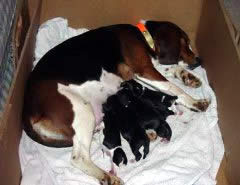 I'm often asked for specifics on how I go about training a beagle pup. Hopefully this article series will give a few folks an idea or two. If it does, then I'll consider it well worth writing.
I'm often asked for specifics on how I go about training a beagle pup. Hopefully this article series will give a few folks an idea or two. If it does, then I'll consider it well worth writing.
Brandy was whelped on May 15, 2002: out of a good female of mine — Miller's Annie. There were 5 surviving pups in her litter — 2 males and 3 females.
All beagle pups are cute, and this litter was no different.
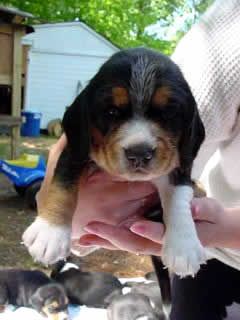 I let them out of their 'puppy palace' each day for 30 to 45 minutes to get some exercise and plenty of human interaction. The litter of pups matured beautifully over the 8-weeks they were with us. Four of the pups in the litter were picked up at eight weeks old and our litter pick, Brandy, was alone. At that time I transitioned her from the puppy pen to the regular kennel. I keep all our hounds on a concrete slab with attached doghouses in the rear. Brandy got her own run. The only alteration that I made for the small pup was adding a square cement block below the opening to her elevated doghouse to allow her to easily get in.
I let them out of their 'puppy palace' each day for 30 to 45 minutes to get some exercise and plenty of human interaction. The litter of pups matured beautifully over the 8-weeks they were with us. Four of the pups in the litter were picked up at eight weeks old and our litter pick, Brandy, was alone. At that time I transitioned her from the puppy pen to the regular kennel. I keep all our hounds on a concrete slab with attached doghouses in the rear. Brandy got her own run. The only alteration that I made for the small pup was adding a square cement block below the opening to her elevated doghouse to allow her to easily get in.
A couple more weeks went by with the usual romping and playing; then her formal obedience training began. A pup's attention span isn't very long at that age, so we started out with 4 or 5 minutes at a time. At 10-weeks old, I let her roam around the yard and occasionally call her to me in an excited voice. “Here, here, here”, I'd exclaim — offering her a small piece of hotdog and some petting when she'd come romping into my lap on the lawn. Like any young creature, she decided not to obey some of my calls, and when this happened she was chastised and put on a guilt trip, with me waving my finger at her in disapproval and speaking in a harsh, disappointed voice. She really didn't like it when I appeared mad or disappointed with her and threw herself at my mercy. I was very pleased that she had a strong desire to please me. Working with a pup is a lot easier when they're tractable than when the pup thinks that they're the alpha, or they'll do whatever they darn well please. There isn't much in this world that's more aggravating than when a Beagle thinks of you, not as the leader of the pack 'the alpha', but as simply a ride to the woods. In my opinion, that would be the biggest fault that a dog could have — bar none.
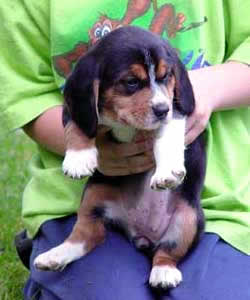 Brandy's yard training continued with the 'down' command. This command I use quite often in the field when I want them to stop whatever they're doing and drop to the ground. She was taught that 'down' meant that she was to drop to the ground on her back and stay there until she was released. When she performed admirably she received a treat and a lot of praise. When she got headstrong and decided to sniff some interesting smell instead of listen to me, she received a verbal scolding. The next command that I use a lot is 'whoa'. My dogs know that when I issue a command and follow it with 'whoa', that I want them to stay still. I'd tell her 'down', then 'whoa'. I'd hold my hand over her rear-end and repeat 'whoa' for 10 or 15 seconds. After a while she caught on. The trick, for me, is to NEVER let them get away with ignoring you. Enforce your command at all costs; otherwise you lost your credibility.
Brandy's yard training continued with the 'down' command. This command I use quite often in the field when I want them to stop whatever they're doing and drop to the ground. She was taught that 'down' meant that she was to drop to the ground on her back and stay there until she was released. When she performed admirably she received a treat and a lot of praise. When she got headstrong and decided to sniff some interesting smell instead of listen to me, she received a verbal scolding. The next command that I use a lot is 'whoa'. My dogs know that when I issue a command and follow it with 'whoa', that I want them to stay still. I'd tell her 'down', then 'whoa'. I'd hold my hand over her rear-end and repeat 'whoa' for 10 or 15 seconds. After a while she caught on. The trick, for me, is to NEVER let them get away with ignoring you. Enforce your command at all costs; otherwise you lost your credibility.
I train all my dogs to go into their doghouses on command and I keep them there with the 'whoa' command. I'll point to the doghouse and command 'get in there', or 'go lie down'. I do this because I don't like getting jumped on come feeding time — and a dog in the doghouse is much less apt to get into trouble by barking when they see me coming, or hear the food dishes clang.
Brandy really didn't like to be scolded, so she decided to obey the vast majority of the time. She was a very easy pup to introduce to basic yard training. For me, that's the first positive step to a potentially successful hunting companion. Without the basic yard training mastered, there's no way for a hound to become a valued hunting partner. I'd re-test her on those basic commands when the opportunities presented themselves, but mostly I just let her be a happy puppy until it was time for the next step.
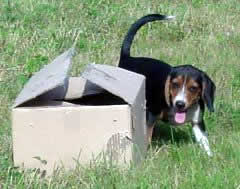 |
|
(Brandy sniffing a box with a rabbit inside)
|
At 12 weeks I introduced her to a tame rabbit. I let the rabbit out for 10 or 15 minutes to hop around the yard, until he went behind a shrub — then I let Brandy out of the kennel. She did her usual romping and racing around the yard — doing laps around the lawn as fast as she could go. Then it happened... she noticed the foreign scent left behind by the bunny. She was intrigued by the new smell and decided to follow it for a little way. It took her a few minutes to follow it along the 20 or 30 yards that the rabbit had gone. When she got to the end of the scent trail, there stood the rabbit. It was motionless and she seamed rather unimpressed. Then the rabbit made the mistake of moving. 'Wow', she thought, as she became a bit more intrigued. He got really daring and hopped a few feet away from the pup. She must have really liked that because she jumped onto his back and he lit out of there. The sight chase was on! He swerved to elude her; then he made a dash for the thick shrubs. She caught up to him once and rolled him. The rabbit got up and made a mad dash to the security of the tangled shrubs. She lost sight of him and appeared to be both confused and mad. 'Where did he go?', she appeared to think. That's when it donned on her to use her sense of smell to try and find him. She sniffed along for 7 or 8 yards into the shrubs, but that was as far as she got before she either lost the scent trail or lost interest — I don't know which. She'll never know it, but that was the beginning of her career as a rabbit dog. The seed had been planted. Now it was only a matter of time until nature took it's course and she went the rest of the way herself. There was nothing that I could do now but give her plenty of opportunity in the wild, where there were rabbits.
Time went on and she tagged along with me while I was running the older dogs. She'd stay with me for a few minutes; then venture out to investigate for a few minutes. That's when I began firing my .22 handgun to ensure that she could gradually handle gunfire. The harsh banging that I had always done at feeding time worked and she didn't appear to even notice the blasts. As time went on, her visits with me grew shorter and the time that she spent with the older hounds increased.
I always keep the first 2 days of the snowshoe hare hunting season open so I can hunt with family and close friends before my busy season gets into full swing. On October 1st, opening day of hare hunting season, she was on one of her short visits with me when two older dogs were running a hare and it headed to me. Brandy was investigating the nearby bushes when the hare bolted across the path I was standing on. I fired and the hare went down, then he thrashed around for a short time. That's when I called Brandy over from the bushes. She got one look at that hare flopping around and decided she wanted a piece of him. She waded in and grabbed the hare. About that time the two older dogs came on the scene, and their frantic reaction made her even more excited. It couldn't have happened any better for a young pup. In a short time the two older dogs had another hare going; Brandy was nowhere to be seen. Later in the race I thought I heard a different voice, but it was hard to be sure. I hoped it was her, but sometimes when you want to hear something so bad, your mind can play tricks on you.
The following day, at 4-1/2 months old she officially started...
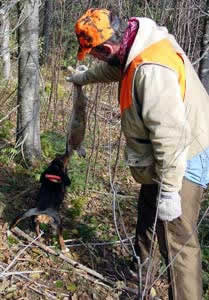 Early that morning I cast her and her mother in a cedar swamp where I thought the scenting would be super. The ground was damp and the weather was overcast. Within minutes Annie had a hare going and soon her pup joined her. 15 minutes later, after about a circle and a half, we harvested the hare ahead of them. Brandy was in and out of the race. The important thing was that she made it to the dead hare. I then put Annie in the truck and worked the pup by herself through some thick cover where I had earlier seen a stray. Within a few minutes she started yipping, then took off running. She ran the hare in a small, 150-yard circle. He came out in front of me and I flattened him. Overall, she was run for nearly 4 hours that morning and played an active part in the demise of 3 hare. It was a glorious day — one that I'll never forget. The picture of that cute, little pup jumping off the ground to grab some fur off a rabbit that I held off the ground — a rabbit that she helped run to the gun — will forever be etched into my mind.
Early that morning I cast her and her mother in a cedar swamp where I thought the scenting would be super. The ground was damp and the weather was overcast. Within minutes Annie had a hare going and soon her pup joined her. 15 minutes later, after about a circle and a half, we harvested the hare ahead of them. Brandy was in and out of the race. The important thing was that she made it to the dead hare. I then put Annie in the truck and worked the pup by herself through some thick cover where I had earlier seen a stray. Within a few minutes she started yipping, then took off running. She ran the hare in a small, 150-yard circle. He came out in front of me and I flattened him. Overall, she was run for nearly 4 hours that morning and played an active part in the demise of 3 hare. It was a glorious day — one that I'll never forget. The picture of that cute, little pup jumping off the ground to grab some fur off a rabbit that I held off the ground — a rabbit that she helped run to the gun — will forever be etched into my mind.
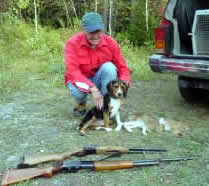 |
|
(Brandy and 'Gramp')
|
![]() That image, along with countless others, occupies a place in my mind and heart where, regardless of my state of mind, I can always look for an uplifting thought.
That image, along with countless others, occupies a place in my mind and heart where, regardless of my state of mind, I can always look for an uplifting thought.
I was busy with a camp full of rabbit hunters for the next 10 days, so my grandfather offered to take her alone to the running grounds and let her get some solo hours. I feel it's important to keep the pressure of a fast pack away from a young hound until they're mature enough to handle it. He ran her solo, 4 times over the next 10 days. She jumped and ran at least one rabbit each trip out and showed noticeable improvement in her rabbit running ability.
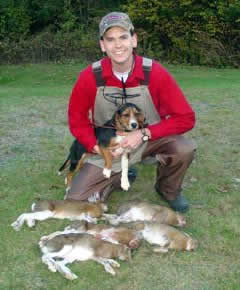 The following week, I had a 3-day stretch where I could do some fun hunting, so I brought Brandy back to camp with the rest of the dogs and had plans to run her each day with Scottie, my puppy trainer. Scottie is a 5-year-old male out of Melanson's Ranger Dan. He's a slower medium speed, very accurate on the line, and is perfect for running a young dog with. It allows the puppy a chance to do a ton of work, and learn how a rabbit should be run. It's important for a young pup to learn that a race doesn't end the first time the hare's scent is lost. That following morning, I cast Brandy and Scottie in a big stand of young cedar trees, bordered by thickets of 6 to 10 foot tall spruce trees; it wasn't 5 minutes before Scottie opened. Brandy quickly joined him and off they went. The rabbit made one nice circle and after 10 or 12 minutes I shot him as he jumped a stone wall. Brandy was 10 or 15 yards ahead of Scottie and ripping off barks about every breath — her fast chop filling the air with beautiful music. She came upon the dead hare and I gave her a ton of praise. It would have taken superman to wipe the smile off my face. Within 10 minutes they had hare #2 going. They ran him for about 45 minutes with only a few short checks. It started to rain lightly and the scenting must have been near perfect. I shot the second hare of the day and congratulated Brandy at the dead hare with a ton of praise and petting. 25 minutes later hare #3 was going and Brandy and Scottie ran him steady for a little over an hour before I was presented with a shot. Hare #3 was in the game bag, and I had my limit. It was time for my grandfather to get in on the action. To make a long story short, 2 more hare were run to the gun that day and 5-month old Brandy was one step further on her journey in becoming a rabbit dog, and valued member of my hunting pack.
The following week, I had a 3-day stretch where I could do some fun hunting, so I brought Brandy back to camp with the rest of the dogs and had plans to run her each day with Scottie, my puppy trainer. Scottie is a 5-year-old male out of Melanson's Ranger Dan. He's a slower medium speed, very accurate on the line, and is perfect for running a young dog with. It allows the puppy a chance to do a ton of work, and learn how a rabbit should be run. It's important for a young pup to learn that a race doesn't end the first time the hare's scent is lost. That following morning, I cast Brandy and Scottie in a big stand of young cedar trees, bordered by thickets of 6 to 10 foot tall spruce trees; it wasn't 5 minutes before Scottie opened. Brandy quickly joined him and off they went. The rabbit made one nice circle and after 10 or 12 minutes I shot him as he jumped a stone wall. Brandy was 10 or 15 yards ahead of Scottie and ripping off barks about every breath — her fast chop filling the air with beautiful music. She came upon the dead hare and I gave her a ton of praise. It would have taken superman to wipe the smile off my face. Within 10 minutes they had hare #2 going. They ran him for about 45 minutes with only a few short checks. It started to rain lightly and the scenting must have been near perfect. I shot the second hare of the day and congratulated Brandy at the dead hare with a ton of praise and petting. 25 minutes later hare #3 was going and Brandy and Scottie ran him steady for a little over an hour before I was presented with a shot. Hare #3 was in the game bag, and I had my limit. It was time for my grandfather to get in on the action. To make a long story short, 2 more hare were run to the gun that day and 5-month old Brandy was one step further on her journey in becoming a rabbit dog, and valued member of my hunting pack.
You can see various video clips of this days runs; including 3 of the rabbits harvested, on the Internet by clicking here.
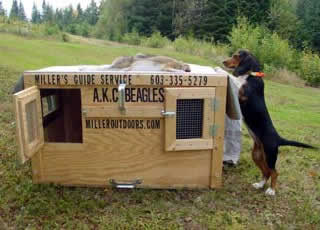 Brandy won't get run with the other older dogs for a while because it would be too much pressure for her. Over the coming months she'll either run solo, with Scottie, or with another pup of equal or lesser ability. That way she's sure to learn at her own pace and not be forced to play catch-up with faster, more advanced dogs. It'll be next spring, when she's about a year old, before she's introduced to our 'meat' pack. If she continues to improve she'll be a great addition to my time spent in the woods and swamps running and gunning snowshoe hare.
Brandy won't get run with the other older dogs for a while because it would be too much pressure for her. Over the coming months she'll either run solo, with Scottie, or with another pup of equal or lesser ability. That way she's sure to learn at her own pace and not be forced to play catch-up with faster, more advanced dogs. It'll be next spring, when she's about a year old, before she's introduced to our 'meat' pack. If she continues to improve she'll be a great addition to my time spent in the woods and swamps running and gunning snowshoe hare.
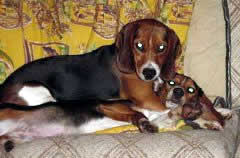 |
|
(Brandy and her Mom, at hunting camp)
|
I'm beginning to get reports of Brandy's littermate's progress. I'm pleased with what I'm hearing. When you bring a litter of pups into the world, it's very gratifying (and relieving) when folks are pleased with them.
Working with puppies is the single most enjoyable aspect of beagling, to me. It's like watching my sons take their first step or throw their first ball. Not all pups work out, but when you start with a well-bred pup, you've got the ingredients to a long and fruitful hunting relationship. How you train them is up to you. I don't pretend to have the patent on starting pups, but I thought I'd share what works for me.
There's no substitute for time spent in the outdoors with a young dog. Get out there and enjoy your hounds.
Yours in Beagling,
Chris Miller




